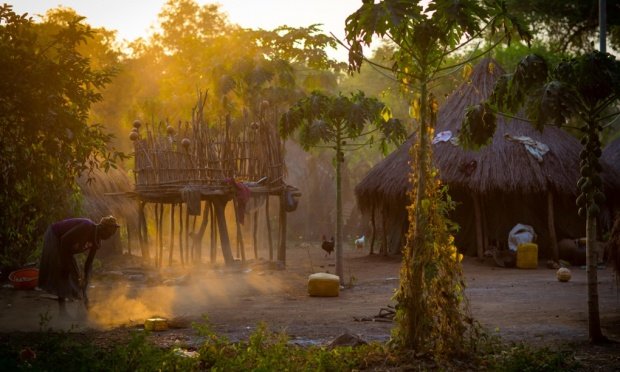Department for International Development will no longer back $4.9bn project that critics claim has funded a brutal resettlement programme
Until last month, Britain’s Department for International Development (DfID) was the primary funder of the promotion of basic services (PBS) programme, a $4.9bn (£3.2bn) project run by the World Bank and designed to boost education, health and water services in Ethiopia.
On Thursday, DfID said it had ended its PBS contributions because of Ethiopia’s “growing success”, adding that financial decisions of this nature were routinely made after considering a recipient country’s “commitment to partnership principles”.
It has been alleged that programme funds have been used to bankroll the Ethiopian government’s push to move 1.5 million rural families from their land to new “model” villages across the country.
Opponents of the commune development programme (CDP) say it has been characterised by violence. One Ethiopian farmer is taking legal action against the British government, claiming UK money has funded abuses against Anuak peoplein the Gambella region. The man, an Anuak known as Mr O, says he was beaten and witnessed rapes and assaults as government soldiers cleared people off their land. DfID has always insisted it does not fund Ethiopia’s commune development programme.
A scathing draft report from the World Bank’s internal watchdog recently concluded that inadequate oversight, bad audit practices, and a failure to follow the bank’s own rules had allowed operational links to form between the PBS programme and the Ethiopian government’s resettlement scheme.
Although the bank’s inspection panel found that funds could have been diverted to implement villagisation, it did not look into whether the resettlement programme had involved human rights abuses, claiming such questions were outside its remit.
DfID, which has contributed more than £500m of UK taxpayer money to the PBS programme, said the decision to withdraw financial support was prompted in part by Ethiopia’s “impressive progress” towards the millennium development goals.
“The UK will now evolve its approach by transitioning support towards economic development to help generate jobs, income and growth that will enable self-sufficiency and ultimately end poverty,” it said.
“This will go alongside additional funding for specific health, education and water programmes – where impressive results are already being delivered – resourced by ending support for the promotion of basic Services programme.”
A DfID spokesman said the move had nothing to do with Mr O’s ongoing legal action or the World Bank’s internal report, but added: “Changes to programmes are based on a number of factors including, but not limited to, country context, progress to date and commitment to partnership principles.”
The department said its overall financial commitment to Ethiopia, one of the largest recipients of UK aid, would remain unchanged, with almost £256m due to be spent between 2015 and 2016.
The Ethiopian government said DfID’s decision was not a matter of concern.
“They have been discussing it with pertinent government bodies,” said the communications minister, Redwan Hussien.
“What they said is that the aid that they’re giving will not be refused or stopped, it will be reorganised.”
The World Bank’s executive board met on Thursday to discuss the internal report on the PBS programme and the management response.
In a statement released on Friday, the bank said that although its inspection panel had concluded that the seizing of land and use of violence and intimidation were not consequences of PBS, it had determined that the programme “did not fully assess and mitigate the risks arising from the government’s implementation of CDP, particularly in the delivery of agricultural services to the Anuaks”.
The World Bank Group president, Jim Yong Kim, said that one of the institution’s core principles was to do no harm to the poor, adding: “In this case, while the inspection panel found no violations, it did point out areas where we could have done more to help the Anuak people. We draw important lessons from this case to better anticipate ways to protect the poor and be more effective in fighting poverty.”
Opponents of the villagisation process have been vocal in their criticisms of the bank’s role. Jessica Evans, senior international financial institutions researcher atHuman Rights Watch, said the inspection panel’s report showed the bank had “largely ignored human rights risks evident in its projects in Ethiopia” and highlighted “the perils of unaccountable budget support” in the country.


























